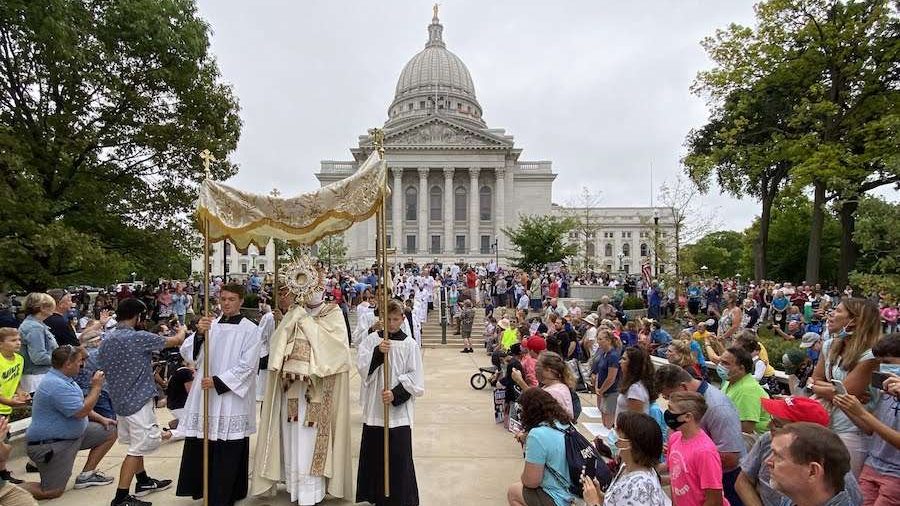Two-and-a-half months after violent rioters wreaked havoc on State Street in downtown Madison, Wisconsin, smashing in windows and looting 75 stores, a different kind of gathering took place.
This time, roughly 2,000 people from throughout the state peacefully processed through the street, led by Bishop Donald Hying carrying the Holy Sacrament in a monstrance, during a Eucharistic procession for peace and unity in the city. Archbishop Jerome Listecki of Milwaukee also joined the procession.
“The ultimate hope is that God would unleash his mighty healing, saving power upon us in a moment of great difficulty and challenge,” Hying told CNA.
“As we look at the pandemic, as we look at the economy, as we look at racial unrest, as we look at violence, at the political situation...we have some very profound problems in our country and all of them ultimately have a spiritual solution,” he said.
Fr. Rick Heilman, who attended the procession and helped organize it, said he was happy with the large and peaceful turnout. Heilman said he did not notice any angry counter-protests or irritated bystanders.
Even the weather cooperated with the event, Heilman added, as rain that had been falling all morning cleared up just as the procession was getting started.
“It was stormy all morning,” Heilman said. “And then the skies opened up as we started, and it was 72 degrees. We haven't had a day like that all summer long.”
Heilman said the procession was organized by Men of Christ, a Milwaukee-based apostolate for Catholic men, and was co-sponsored by multiple local ministries and parishes. The idea for a Eucharistic procession had been inspired by a recent successful procession led by Heilman and his parish on the Feast of Corpus Christi in June, in which roughly 300 people participated.
The procession was held on Saturday, August 15, on the Feast of the Assumption of the Blessed Virgin Mary. It was named the “Unite Wisconsin” procession because of its goal of uniting the state in prayer, Heilman said.
“We are called to be unified. But unified where?” Heilman said. “At the foot of the cross. At the truths of the Gospel.”
Heilman said he has also been organizing groups to pray the rosary at the state capitol since May, when protests and riots erupted over the killing of George Floyd, a Black man killed by police in Minneapolis on May 25. He said he’s been inspired by the image of Our Lady, Queen of Peace, a statue of Mary at the Basilica of St. Mary Major in Rome, in which Mary is holding out one of her hands in a way that seems to be asking people to stop being violent.
Heilman said the Gospel passage that he keeps turning to in these unprecedented times is the one where the apostles are in a boat on a stormy sea, and Jesus comes to them, walking on the water. When Peter realizes it is Jesus, he asks to walk on the water too, and Jesus calls him to do so.
“But then what happens is (Peter) starts noticing the strength of the storm,” Heilman said.
“So what does he do? He takes his eye off of Jesus,” he said.
“And in essence, the interpretation of that is that, he's believing that the storm is more powerful than the son of God,” Heilman added. “So I've been telling people, just remember this: God is more powerful than the devil. Okay? And you’ve got to keep your eye on God. And I'm hoping upon hope that this period of time that we're going through is kind of awakening all of us to be even stronger in our belief in the supernatural power of God.”
Bishop Hying added that another one of the goals of the procession was to give people hope, during a time where they are more isolated than normal due to the coronavirus pandemic, and when the unrest in the country may be causing distress and despair.
“Many participants commented on that - that the day, the (procession) experience, gave them hope. They're mired in despair, social isolation and fear, and coming together publicly with the Lord really gave them light, hope, and peace to move forward,” he said.
The day of the procession was also the first day of a 54-day rosary novena that many people are participating in, Hying said. He noted that he, like many other bishops, has been encouraging the recitation of the rosary throughout the pandemic.
“Mary is our greatest advocate before the throne of God. Mary is the one who gave birth to the Lord in his human flesh, but also before that was the first disciple, the first believer,” he said.
“So we see her both as disciple and mother and…(as) St. Louis de Montfort puts it so beautifully, we receive the fullness of Jesus through Mary, so it makes sense that we go through Mary to encounter Jesus fully as well.”
Hying added that Eucharistic processions are common throughout the history of the Church, when the world has faced challenging times.
“Anytime in Church history, when we faced severe challenges, we would process with the Eucharist,” he said. “We'd allow the power of the Eucharist to be brought into the streets and unleash the gift of Jesus.”

